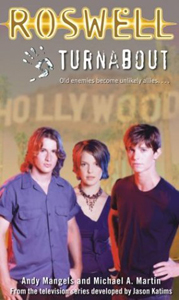After three TV seasons and 10 previous books, the “Roswell” saga arrives at its country-spanning conclusion, “Turnabout” (November 2003). Andy Mangels’ and Michael A. Martin’s novel, the wrap-up of the many threads laid down in “Pursuit,” finds different groups of heroes fighting little battles and doing little missions until it all comes together in a huge showdown. I enjoyed reading it, and the authors serve all the main characters well.
Serving many masters
At the same time, “Turnabout” shows that the tie-in book series was never interested in narrative cohesion, even though many of the books are good. Even if we focus on the four books that comprise “Season 4,” the first two – “A New Beginning” and “Nightscape” – have nothing to do with the two-book finale. It’s not relevant that an alien race is kidnapping women or that Skins leader Nikolas is still out and about.
It must be difficult to serve nearly two dozen characters in a plot- and strategy-driven book without overwhelming a reader, and Mangels and Martin do pull that off. There’s no one among the major players who is left on the bench. Kyle in particular gets a key role as he gets a handle on his psychic-communication abilities at the same time the group needs those powers.

“Turnabout” (2003)
Authors: Andy Mangels and Michael A. Martin
Series: “Roswell” No. 11
Genre: Science fiction
Setting: Various locations, “Season 4”
Not everything rings true. The fact that Langley is the overseer of the Dupes the same way Nasedo had that role for the Roswell Royal Four is intriguingly introduced in “Pursuit,” and in “Turnabout” Langley feels bad about being neglectful of the four New York-based teens. I don’t think even Joe Pantoliano could’ve sold what’s on the page.
Outside of Langley’s underexplored inner turmoil, nothing feels out of character for anyone’s actions — except sometimes with their dialog. The teens make too many pop-culture references. This is a problem with some “Buffy” tie-in novels, too, but at least “Buffy” is known for pop-culture references.
“Roswell” isn’t, so “Turnabout” feels too loaded with these. I just can’t imagine Maria correcting a “King Kong” misquote, or Liz making time to watch “The Dead Zone” every week when that time could be spent brooding about her relationship with Max.
Tying things up
“Turnabout” looks to tie things up more than look forward – except for the last 30 pages of the 262-page tome. To their credit, the authors hint at one pairing I wanted: Kyle and Ava. Nick Wechsler and Emilie de Ravin had sizzling chemistry in Seasons 1 and 2, but a potential Kyle-Tess romance didn’t get off the ground the way it should have. Kyle-and-Ava (Kyva?) is exactly the right choice, but I’m disappointed that it’s only in the epilogue rather than being peppered amid the action.

Like Kyle in one group, Ava gets to play the hero among her group in cool fashion thanks to her mindwarp ability, which is so much more powerful than the timid personality that finds her meekly following Rath and Lonnie.
I could’ve stood to read a lot more about her, especially since the Dupes are the ones who face the biggest threats from the Special Unit, which is obsessed with dissecting them like science-class frogs. Even though this is the very end of the “Roswell” saga, I never felt that any of the Roswell teens would be killed off.
Also in the epilogue chapters, we get a peek inside the mind of Margolin, one of the Special Unit agents. This is too little too late, though. While I didn’t need to know the motivations of every SU agent to know the government is indeed capable of marshalling forces against what it deems a dangerous enemy group, I would’ve rather gotten it in the build-up rather than the wind-down.
To the authors’ credit, they do make a few of the SU agents into distinct people; this is why Agent Pierce (David Conrad) of Season 1 is more memorable than the almost nameless agents of Season 3 – time is spent on him. One of these new bad guys, codenamed Viceroy, visually reminds me of Agent Smith from “The Matrix.”
A daring strategy
As for the plot, I like the strategy that the title refers to. Our heroes – largely because of brilliant file-stealing and planning by Phillip Evans — decide they will reveal the Special Unit’s existence to the public. Then they’ll put their fate at the mercy of the public, which will then side with alien teens or secret government operatives once it’s armed with the evidence.
Mangels and Martin broach this fascinating notion, but then the plot takes a full-on SF turn and the whole conflict is solved with alien powers. This stuff is written with clarity and verve considering how sci-fi it is, but it’s not as thematically fascinating as the “reveal ourselves” strategy. Especially since the authors built up that idea that the aliens revealing themselves could work – for example, many members of the news media are aliens — I wanted to see it play out.
For all my quibbles about “Turnabout,” there’s never any doubt that Mangels and Martin are “Roswell” fans who know this narrative and these people well. Things that even the TV shows’ writers probably hadn’t thought out, such as the communication devices introduced back in Season 1, play almost predestined roles in this finale.
In some ways, “Turnabout” is about ironing out the messiness that is the narrative of three TV seasons and 11 books that never had a single guiding hand. (Nothing against Jason Katims, but he had various masters to serve while producing the show.) With that in mind, the authors do yeoman’s work in piecing together such grand stakes. I’m putting “Turnabout” back on my “Roswell” shelf feeling satisfied with the ending and happy that we got a “Season 4” in some form, but also kind of exhausted.

